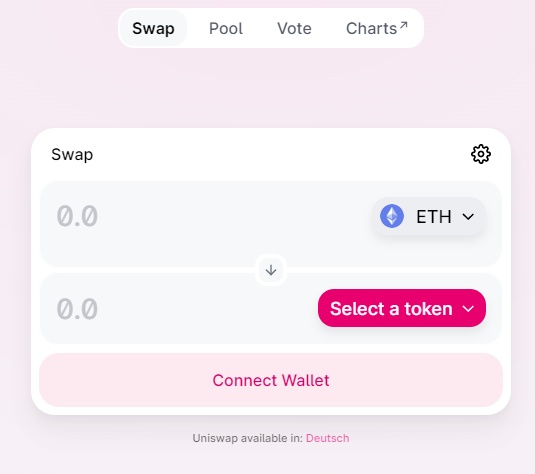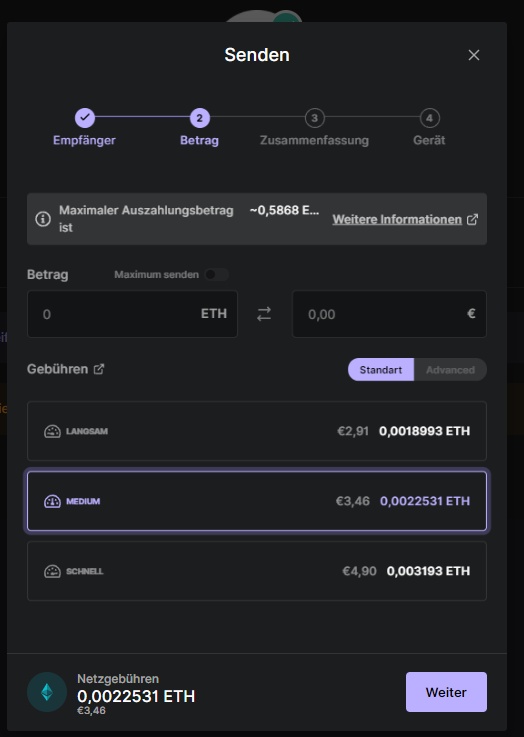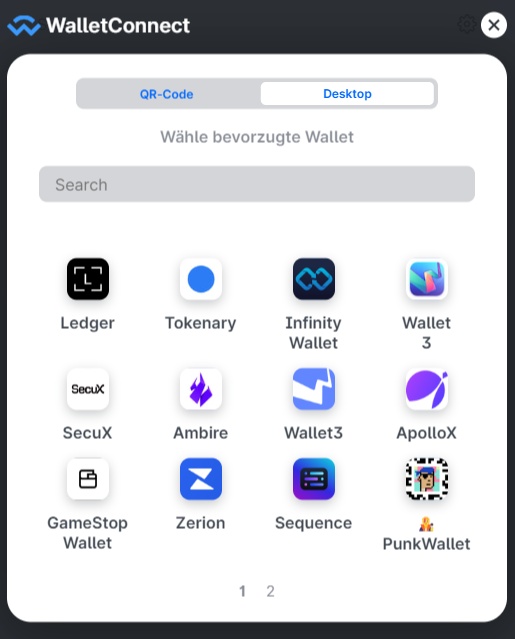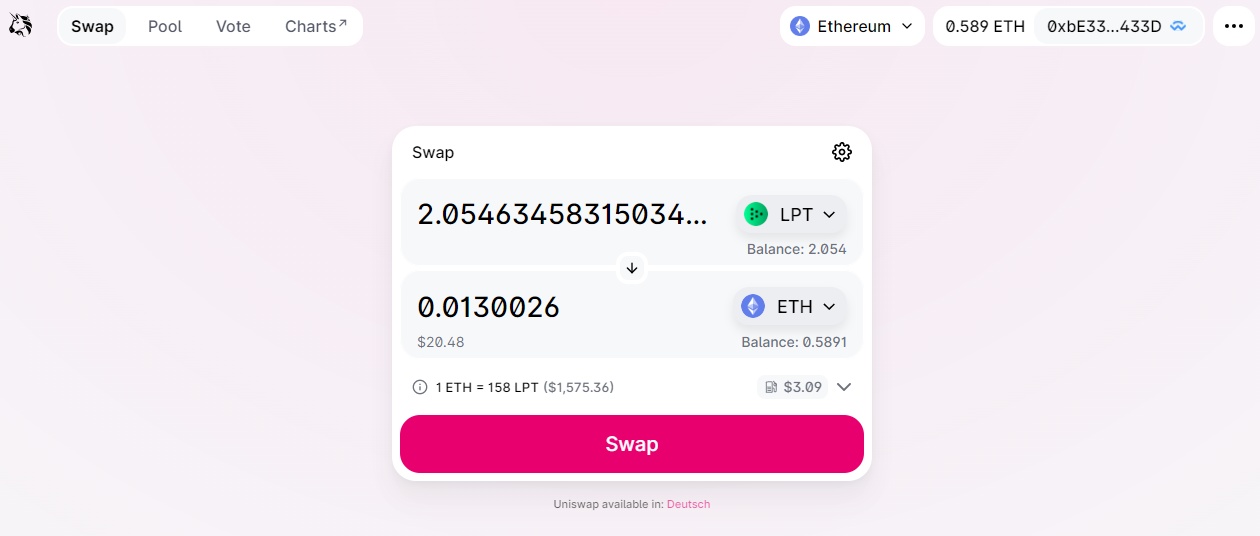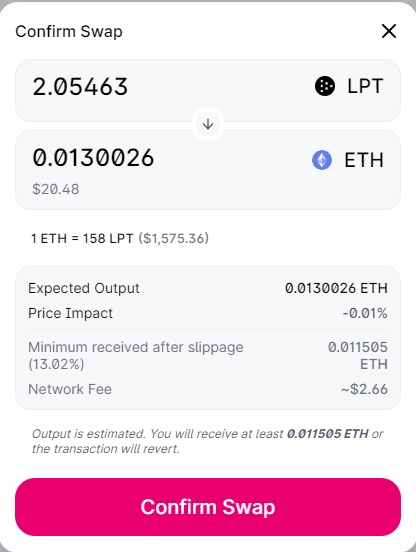How To Uniswap with Hardware Wallet
Or: Crypto is a speculative object but not so far away from being suitable for the masses
Some of you may remember my post about my odyssey to my first NFT. Those who don't remember can read it here: Crypto is speculative and miles away from mass adoption - https://app.getquin.com/activity/QpLqWcSLtc . Recently, I ventured into a new "project". I wanted to trade crypto for crypto, avoiding fees from central exchanges as much as possible. How where what why, and whether I was successful in the end, you read in this post.
What is it all about?
I have been holding Ether for several years on addresses whose private keys are secured via my hardware wallet (Ledger Nano S). Occasionally, there are so-called "AirDrops" on the Ethereum blockchain, where tokens (i.e. other cryptocurrencies that use the Ethereum blockchain) are distributed to certain addresses for free. For example, as a promo action for a new token. For example, a few years ago good 2 LPT, the token of the Livepeer platform, reached me via an airdrop. According to the website, Livepeer is a decentralized video streaming platform. I don't know, I'm not interested in it either. At the beginning, these tokens are usually worthless because they can't be traded anywhere. Most of the time, they stay that way. But they also don't interfere in the wallet, so you just leave them where they are. I recently discovered by accident that LPT can now be traded on various exchanges and definitely has value. At the time, about 10 USD / LPT. Since I had no use for this token, I wanted to exchange it for Ether.
And how does that work?
The usual way would certainly be to send LPT from my hardware wallet to a platform like Binance, exchange it for Ether there, and then send the Ether back to my hardware wallet. Since I only had a total of $20 worth of LPT, I wanted to keep the absolute cost as low as possible. If I had gone through Binance, I would have incurred the following fees:
- Network fees for the transfer from the hardware wallet to Binance.
- Fees for exchanging LPT to USDT on Binance (LPT cannot be exchanged directly to Ether on Binance).
- Fees for exchanging USDT for ETH on Binance
- Fees for "withdrawing" Ether on Binance
- Network fees for transferring from Binance back to my hardware wallet
In the worst case scenario, the fees would consume the entire 20 USD. Fortunately, Uniswap came to mind.
Unis... what?
Uniswap. A DeFi platform on the Ethereum network. In simple terms, a decentralized exchange that allows users to anonymously trade any token on the Ethereum blockchain (including Ether itself) for each other via smart contracts without signing up. Since LPT is a token on the Ethereum blockchain and I want to trade it for Ether, I figured, jackass I thought, give this a try. It can't be worse than back then with the NFT. Or? OR?
The process
So I just typed uniswap into Google and went directly to the project page. https://uniswap.org/ project page. In the upper right corner a pink button with "Launch App" laughed at me. It caught my attention and sounded trustworthy. So just don't think about it, but click on it.
I landed on a very (really very) simple and clear website ( https://app.uniswap.org/#/swap?chain=mainnet ),which gave me the possibility to select two tokens to be exchanged into each other. See screenshot at the end of the post. So simply times LPT in ETH selected. In addition, I found below again a button to connect a wallet. After clicking on it, I was offered to connect to MetaMask, Coinbase Wallet, WalletConnect or Fortmatic. I chose WalletConnect and was able to start my Ledger Live app directly from the desktop tab (see screenshot).
All I had to do now was confirm the connection in my Ledger Live app and my ETH and LPT balance were displayed in the Uniswap app. Along with a nice big "swap" button. In addition, the expected network fees and conversion rate were shown. You can also see this in a screenshot at the end of the post. It was surprisingly easy to do.
Alright, let's swap then. I then had to confirm a transaction on my ledger. This was a bit irritating as I was only shown the network fees but not that anything had been sent anywhere or that I was getting anything else in return (see screenshot). So I should be paying fees for what appears to be an empty transaction. Do I do that? Of course I do. No Risk No Fun!
Consequently, the transaction was confirmed by me and the transaction fee was deducted from my Ethereum address. And otherwise? Yes, nothing else happened. I did not receive any Ether and my Uniswap also remained in my account. Now what? Swap again? Pay transaction fees again? Well, wait and see, maybe it takes a bit until the transaction is completely confirmed.
So I waited and googled if I had made a mistake. Thereby I came across this How-To-Article from Uniswap https://help.uniswap.org/en/articles/5391957-how-to-swap-token. It explained to me that when I first wanted to exchange one token for another, I first had to approve that exchange with an "Approve" transaction. So I didn't initiate an exchange with my first click on the swap button, I just gave Uniswap permission to access my Livepeer in my wallet.
Okay, that could have been made more user-friendly. However, death-defyingly, I decided to click the swap button one more time. I had to reconfirm the transactions (empty again, just network charges) on my ledger. This time, however, the LPT left my wallet and I was sent the amount of Ethereum that matched the exchange rate.
Wow, that worked!
Cash check
Compared to the central exchange, I didn't have to pay the exchange fees or the withdrawal fees. In addition, if I wanted to exchange Livepeer again, I would save the network fees for the Approve transaction. This is also relatively easy to track via Etherscan. These are the most recent two transactions (Approve and Multicall) https://etherscan.io/address/0xbe3396b0649167b885bc83f75f00e20924cc433d . Whether / how much spread I paid, however, is not transparent to me.
Conclusion
Of course, there are still minor improvements to be made in terms of user-friendliness. However, considering my odyssey to my first NFT and remembering that we are talking about a very young technology, it was surprisingly easy. Overall, moreover, it was a cool feeling to have conducted a transaction through a decentralized broker without KYC. At the same time, my tokens never had to leave my secured hardware wallet.
I will choose this token swap route whenever possible in the future. Would I invest in Uniswap because of this? No. There are decentralized exchanges a dime a dozen. Moat / unique selling proposition = missing. Moreover, Uniswap is a service on the Ethereum blockchain. Just like Google is a service on the internet. No doubt Google / Alphabet is a good investment. But if it were possible to invest directly in the Internet, that would certainly be an even better investment. In Ethereum, on the other hand, I can invest directly. Therefore, if I am convinced of the technology, I would always prefer an investment in Ethereum over an investment in Uniswap. Of course, there is the possibility to achieve higher returns with Uniswap. But that is nothing more than speculation.
#crypto
#learn
#ethereum
#ledger
#esel
